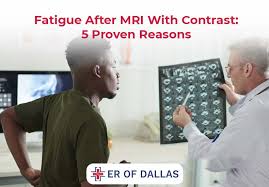


Feeling fatigued after a CT scan with contrast? Discover the causes, and recovery tips. ER of Dallas provides expert advice for your health.
A CT scan with contrast involves the use of a special dye that highlights blood vessels, tissues, and organs, making it easier for doctors to detect abnormalities. While the scan is quick and painless, some individuals may experience lingering side effects, including fatigue after CT scan with contrast.
This fatigue can range from mild to severe, depending on individual factors such as hydration levels, allergies, or sensitivity to the contrast agent. In this article, we’ll delve into the potential causes of fatigue, address common concerns, and provide actionable advice for recovery.
A CT scan combines multiple X-ray images to create detailed cross-sectional images of the body. When a contrast agent is added, it helps highlight specific areas for better visibility.
Several factors can contribute to post-CT scan fatigue. Let’s explore these potential causes:
The most common reason for fatigue is your body’s reaction to the contrast dye. Though rare, the following reactions may occur:
If your body is sensitive to iodine-based contrast agents, the effort to metabolize and eliminate the dye can be more taxing.
Contrast dye is processed through the kidneys and expelled via urine. If you’re not properly hydrated before or after the CT scan, dehydration can occur, leading to fatigue. Symptoms of dehydration include:
Undergoing a medical procedure can cause stress and anxiety. Even if the scan itself is quick, the anticipation, noise of the machine, and uncertainty of results can be mentally and emotionally exhausting. Post-stress fatigue is a common occurrence.
For some CT scans, especially those requiring oral contrast, patients may be asked to fast for several hours beforehand. Lack of food and water can leave you feeling weak or tired after the procedure.
While CT scans are generally safe, they do expose you to a small amount of ionizing radiation. Some individuals may feel mildly fatigued as their body recovers from this exposure, though this effect is rare.
Pre-existing health conditions such as kidney disease, anemia, or chronic fatigue syndrome can exacerbate feelings of tiredness after the scan. Your body may require more energy to process the contrast dye and recover.
If you’re feeling drained after your CT scan, these practical tips can help you recover more quickly:
Drink plenty of water before and after the procedure. Hydration helps your kidneys flush out the contrast dye more efficiently, reducing fatigue.
Pro Tip: Aim for at least 8-10 glasses of water in the 24 hours following the scan.
Allow yourself time to rest after the procedure. Avoid strenuous activities and give your body the energy it needs to recover.
Tip: Take a short nap or engage in light activities such as reading or watching a movie.
Replenish your energy with a well-balanced meal that includes:
Both caffeine and alcohol can dehydrate your body. Stick to water, herbal teas, or electrolyte drinks to stay hydrated.
If you’re feeling unusually tired, don’t push yourself. Take breaks as needed and prioritize your well-being.
Feeling fatigue after CT scan with contrast is a common experience for some individuals. Whether it’s caused by the contrast dye, dehydration, or stress, the fatigue is usually temporary and manageable with proper hydration, rest, and nutrition.
If you have concerns about prolonged fatigue or experience additional symptoms, seek medical advice promptly. At ER of Dallas, our experienced team is here to ensure your health and well-being before, during, and after your medical procedures.
